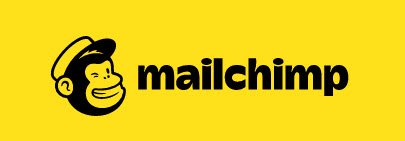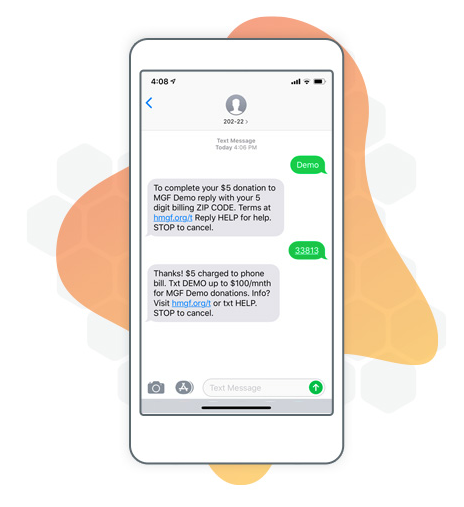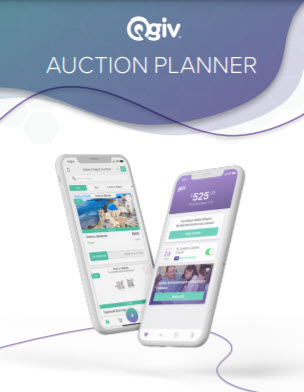Planning a church auction to raise funds for your important work? Not sure where to start? This guide to fundraising auctions for churches is for you! It covers software that will make your auction more successful, auction item ideas that are sure to delight your donors, and helpful tips to make your next auction more profitable.
Must-have software for your church auction
While pen and paper auctions may have been the norm a few years ago, fundraising auctions are rapidly moving online. With the right software, your church auction can be highly profitable. That means you’ll receive more donations to fund the important work you do. Below are our picks for must-have software for fundraising auctions.
Qgiv’s online auction tools
Okay, we might be a little biased, but we designed our auction tools to help make it easy for your supporters to bid, buy, and give during fundraising auctions – from anywhere!
How bidders benefit
Bidders at your auction can take part using the Givi app or from the web browser of their computer, tablet, or cell phone.
How you benefit
How does your church benefit? For starters, you don’t have to keep track of paper bid sheets! Bidding is done digitally, which makes it exponentially easier to track. Additionally, your auction will earn more bids because your guests are notified when they’re outbid if they’re using the Givi app.
In addition to offering a streamlined bidding experience, your auction event page is customizable to match the look and language of your church. From the registration process to checkout, your supporters will have a consistent, branded experience that lets them bid confidently.
Qgiv also offers unlimited support from an award winning customer service department to help ensure your auction’s success. Request a demo of Qgiv’s auction tools.
An email service provider
Getting the word out about your auction is key to its success. Email offers the best return on investment according to Campaign Monitor. If you’re not using an email service provider to make sending email communications a streamlined and efficient process now’s the time to consider adding an email service provider to your toolkit. Here are out top recommendations for email service providers.
Mailchimp
One of our top choices for email service providers is Mailchimp. They’re an email marketing solution that offers a free plan that smaller nonprofits can use at no cost.
Their free plan includes a contact list of up to 2,000 individuals and one email audience. That said, if you use segmented lists or have multiple audiences you may need to opt for a higher tiered plan.
With Mailchimp, you not only gain access to an intuitive, drag and drop email builder, you also get a custom Mailchimp domain for professional emails, a website builder tool, landing pages and forms, and access to their Creative Assistant. That’s all included on the free plan. At higher plans, you also gain email testing tools, real-time analytics, access to a wider collection of email templates, and more.
You can also integrate your Mailchimp account with Qgiv to sync over your supporters as contacts!
Constant Contact
Another great option is Constant Contact. Constant Contact offers a lot of similar features to Mailchimp. They offer a free 60 day trial of their email marketing tools, and have plans starting at $20/month.
With the basic email plan, three users from your organization can use the software to create and send emails about your fundraising events. The size of your contact list isn’t limited, which is great for larger religious organizations. Plus, they’ve got real-time email analytics as well, so you can gauge performance of your email sends from the moment they get sent out.
Qgiv also has a Constant Contact integration so importing your contacts from Qgiv into Constant Contact is easy!
Other powerful email marketing tools for your consideration are Emma and Campaign Monitor. Both integrate with Qgiv and can help you craft stunning event emails to grow your church fundraisers.
A great CRM
CRM software makes it easy to manage your supporters before, during, and beyond your auction event. What is a CRM? CRM stands for Customer Relationship Management. Your donor database is usually housed within a CRM system. These tools should make it easy for you to learn about your donors, access and update their contact information, track their giving history, and include the ability to add notes about face-to-face meetings and important information about your supporters.
When it comes to your church auction, your CRM is essential for pulling contact lists for event invitations. Plus, you can use your CRM to track who attended, what they purchased, and your post-event communications with your donors. Qgiv offers integrations with several CRM systems designed specifically for religious organizations like yours. Looking for a CRM for your church? Here are some of our top recommendations.
Fellowship One
One great option for a church-specific CRM is Fellowship One. They sell themselves as a church management system. Not only do they have a CRM for your congregants, they also offer payroll and accounting functionality, service planning software, website hosting and design help, and more.
Fellowship One has been in operation for sixteen years and helps more than 4,000 churches.
Church Community Builder
Another great choice is Church Community Builder. They’re a CRM that focuses on engaging your congregants and keeping them coming back. You can organize congregants into groups, organize volunteers, make helpful contact lists for your auctions, and more.
Other great CRM options include Salesforce, Bloomerang, and DonorPerfect. While these three choices are not geared specifically to faith-based organizations, they offer a ton of great tools to help all kinds of organizations manage their relationships with their supporters.
Livestreaming software for your auction event
If you’re hosting a virtual auction event or are planning to host it in a hybrid format, livestreaming is a must. Livestreaming your church auction event will keep those who can’t participate in person engaged and bidding. Here are our picks for the best livestreaming solutions for churches.
Facebook Live
Our first choice for livestreaming services is Facebook Live. Facebook Live is free to use, which is great for your event budget. Second, your participants can raise funds on Facebook while watching and engaging in your event livestream on one platform. Third, you can broadcast the Facebook Live livestream on your Facebook event page and via the video widget in your Qgiv events! That means that no matter where participants are, they can take part in the church auction.
It’s also important to note that when you finish your Facebook Live broadcast, a recording is made of the livestream that you can share to your social media accounts for those who missed your event.
YouTube live
YouTube Live is another free livestreaming service powered by the YouTube platform. Similar to Facebook Live, livestreams made with YouTube live can be shared on Qgiv event pages. Plus, when you finish livestreaming, YouTube Live will create a video you can share to social media for event recaps for those who missed your event. That said, you can’t fundraise directly on YouTube and neither can participants.
Other great choices for livestreaming your event include Zoom or GoToMeeting.
Social media is a must-have for any fundraising event

If your church hasn’t created accounts on social media yet, you may be missing out on a lot of engagement with your supporters. In our report, Navigating the Unknown, we found that social media was the number one way donors would choose to interact with organizations they support. That’s a pretty compelling case for creating a Facebook page! Not only is social media helpful for communicating with your followers, as these platforms have evolved they’ve become important vehicles for charitable work. In fact, Facebook has even developed giving tools to help nonprofits fundraise directly on its platform!
At the very least, your nonprofit should set up a Facebook page for itself and a Facebook event page for your church auction. Why? A Facebook event page makes it easy for your church to communicate about your event. Plus, the event pages are shareable so your supporters can quickly get the word out for you! Include a link directly to your registration page on your Facebook event page to make it easy for those who find your auction to join in the fun and help with fundraising.
You don’t need an account on every social media platform, but for a church auction event, having an Instagram account can be very helpful. How? Instagram is an image-based platform. You can easily share auction item updates directly to your church’s page to entice your supporters to sign up and bid for available auction items. Your Instagram Story is also a great place to post past-event highlights and even communicate about your event to get supporters interested.
Bonus software for your church auction
The items below are nice to have but aren’t essential for your church auction. However, they do have the potential to increase the profitability of your auction event.
A matching gifts tool

Matching gifts help church donations go farther. Matching gift software helps to ensure that more eligible matching gifts are matched. When you accept online donations during your auction it helps to remind donors that matching gifts are an option. Using a matching gifts integration with Double the Donation, HEPdata, or CyberGrants is a great way to get donors to search for matching gift opportunities from their employer so they can double (or sometimes triple) their impact. It’s as simple as embedding a matching gift search widget on your auction donation page. Plus, Qgiv offers integrations with these three matching gift services!
Text fundraising tools
Another tool you may be interested in incorporating into your church auction is Qgiv’s Mobile Suite. Mobile Suite is a text fundraising solution that includes the ability to send outbound text messages to your supporters. It’s great for sending event reminders, providing important notifications to supporters not bidding via the Givi app, and even raising funds by using text keywords.
These last two tools are a great way to grow your annual giving too!
Auction item ideas for your church auction
Your church auction needs items that will excite your event attendees if you want to drive bids and be successful. To increase your auction’s profitability it also helps to get as many items donated as possible. Strive to collect a variety of items of different value so all of your supporters have items to bid on.
Some big ticket items that you can auction off are vacation packages, big screen TVs, and high-end electronics. That said, the best items for your auction are those that appeal to your supporters. The best auctions include items that are valued by your unique community. To shake things up at your auction consider some of these unique auction item ideas.
Services
Offering helpful or unique services for auction is a great idea to help people save money while earning money for your nonprofit. Some services that your supporters may find helpful include:
- Free oil changes for one year
- House painting services
- A free week of home cleaning
- Landscaping
Experiences
Sometimes what your auction goers really need is the opportunity to try something new. Consider offering experiences for individuals, couples, or the whole family to enjoy together. Here are some exciting experiences to consider for your church auction:
- Skydiving
- Bungee jumping
- Zoo/aquarium trips
- Amusement park tickets
- Tickets to a major sporting event
Unique auction items
The first two categories are for those who are looking to add convenience or excitement to their lives without bringing more stuff home. However, you should offer unique physical auction items at your event. This can come in the form of themed gift baskets or unique single items that bidders will love. Here are some great items to include in your auction event:
- Memorabilia from sports or pop culture
- Unique items related to your church, such as prints of historic photos of the church’s founding
- Themed gift baskets
- A collection of snacks from foreign countries
- A local business gift basket featuring select items from local businesses
- Handcrafted items like quilts, artwork, or furniture
Want more auction item ideas? Check out this great handout for 25+ unique auction items.
Church auction best practices
When you’ve got auction items figured out and your church auction software needs are met it’s time to build and host your auction. How can you be most successful? The following auction best practices will help!
Give yourself plenty of time
A fundraising auction takes a lot of work. You’ve got to gather items, write descriptions for them, secure a venue, market the event, and more. A week is not enough time to effectively accomplish all these things! We think even a month is cutting it too close! Do yourself a favor and give yourself 3-6 months to build and market a stellar church auction.
Have a solid plan for your auction event
You can give yourself the time you need, but if you don’t develop and stick to a plan for your event your donors may end up less than impressed. Luckily, Qgiv has put together great auction planners to help make your church auction more successful. These planners offer a step-by-step process for preparing for and hosting your auction.
For in-person auction events Qgiv’s auction planner covers everything you need to consider to be successful, including helpful hints about managing your venue. If you’re hosting a hybrid or completely virtual fundraising auction, Qgiv’s virtual auction planner has useful tips for offering a great virtual event experience.
Put a post-event communication plan in place
Just because your auction ends doesn’t mean your guests no longer want to hear from you. Developing a post-event communication strategy to keep supporters engaged and new donors invested in your cause.
Your post-event communications should thank guests for attending and giving during your church auction. Beyond that, you should plan to communicate about the impact of your attendees’ gifts. How is your church using the funding you received? What have you accomplished thanks to their generosity? Lastly, you can invite event attendees to get more involved. They can advocate for your cause, volunteer, go on mission trips, or even become new congregants if they weren’t members of the church before the auction.
Communicating after an event ends keeps participants engaged until your next event. It also can provide the motivation needed to recruit long-term supporters for your organization.
Conclusion
A successful church auction is within your reach. With the right software solutions, auction items, and adherence to auction fundraiser best practices, your church auction will help you raise funds needed to do more good works in your community and abroad. Ready to host your church auction? Qgiv can help.












